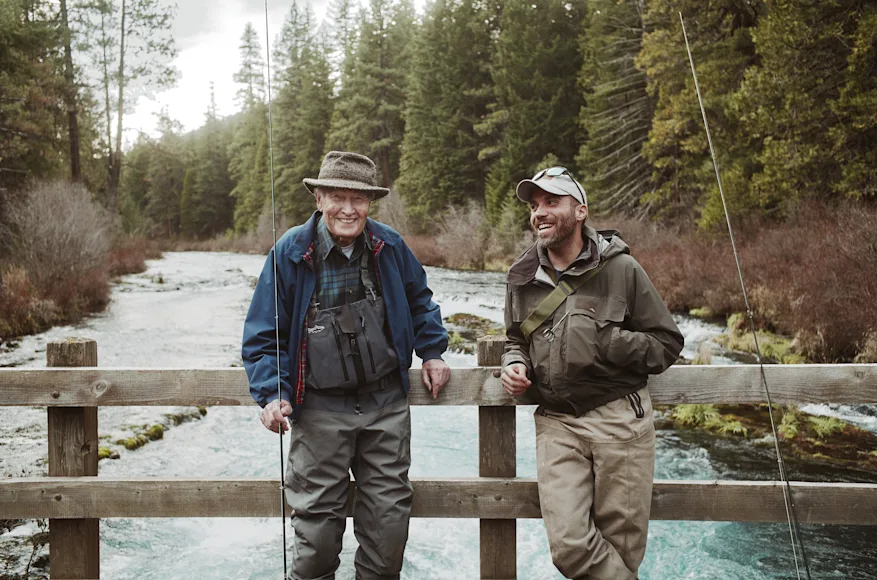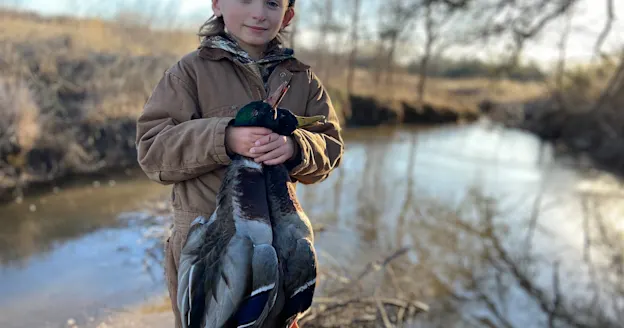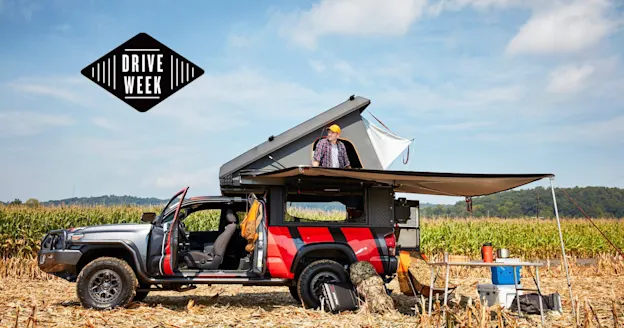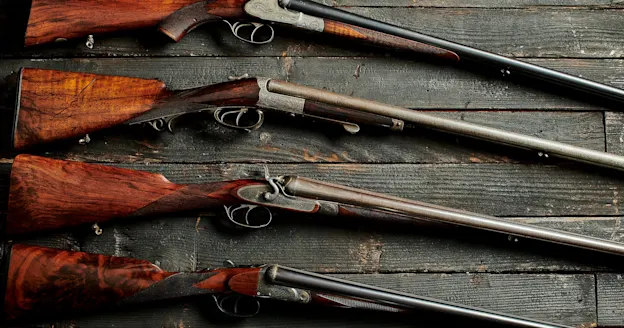MY FISHING BUDDY and I are an unlikely pair. At 82 years old, he’s an old man; at 42, I only feel like one. He was born and raised in Nazi Germany, whereas I am a Jew. These differences hardly matter when Volker Oakey and I get together.
We started fishing with each other about 10 years ago, after I married his niece. Our first trip, as far as I can remember, was to a crystal-clear, alpine lake—ringed by the Cascades—in central Oregon. That summer afternoon, we arrived at Hosmer Lake just in time for the evening hatch. We strung up our fly rods and launched Volker’s canoe, paddling to where the lake’s Atlantic salmon (no longer stocked there, unfortunately) gulped mayflies from the transparent surface. I tied on a big, bushy fly and cast to one of those rises. Then I waited.
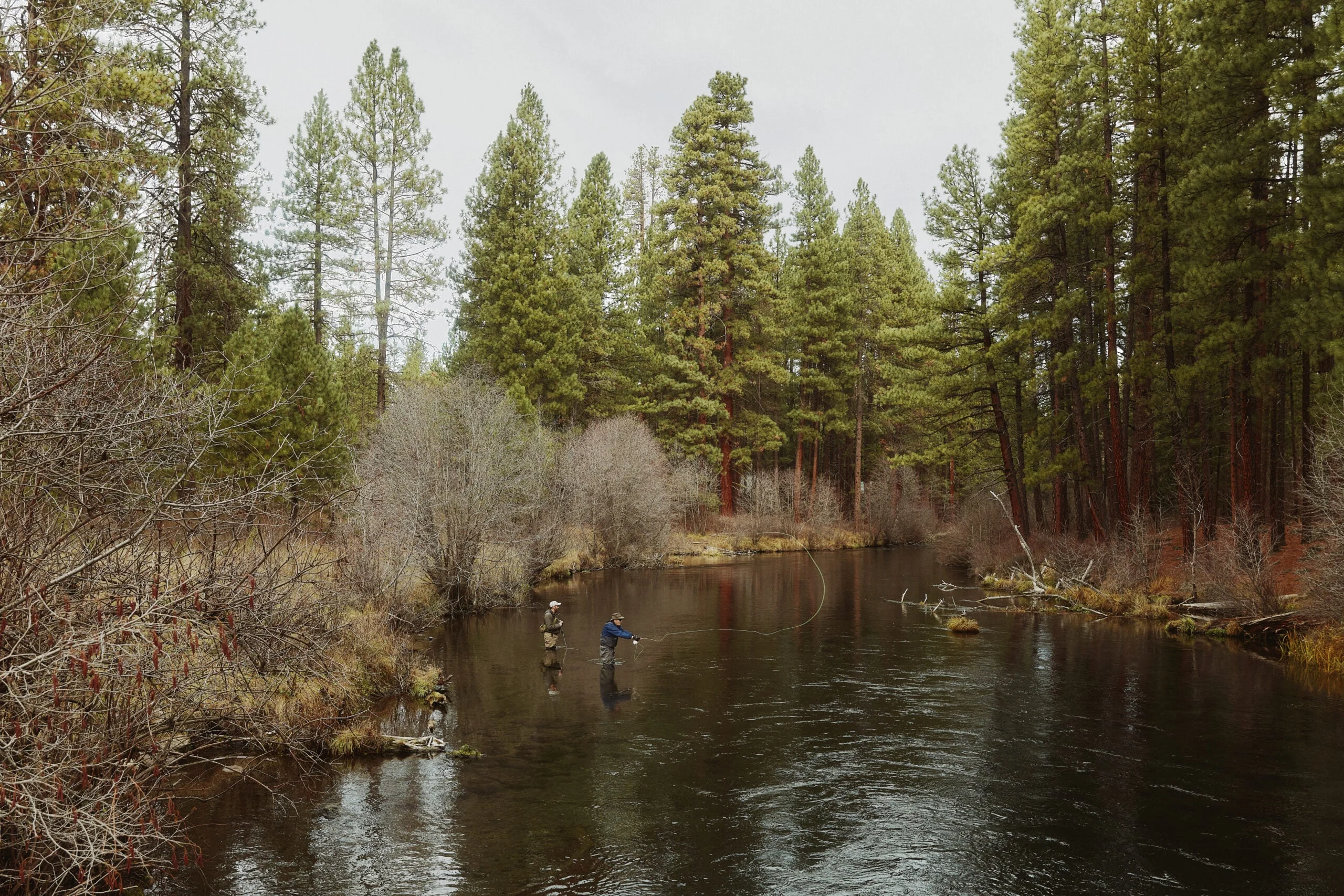
Volker unfurls a cast on a promising stretch on the Metolius. Mason Trinca
Volker owns a home nearby, on the edge of National Forest land. From his back porch, the Cascade Mountains dominate the horizon. My wife, a lovely Catholic who went to high school with me, stayed at the house with Volker’s wife. They’re related. The fishermen—Volker and I—merely married into the family.
At Hosmer, my vigil was obliterated by a hungry salmon. I set the hook, and the fish took off, jumping a few times before Volker netted it for me. The salmon was beautiful, like the mountains and the water itself. With the stunning landscape and rising fish, it was a perfect outing.
I caught one more fish that evening, but Volker got skunked. That said, I was more upset than he was. Not only is Volker one of the nicest people I’ve ever met, he’s also one of the most resilient; he deserved a fish.
Volker and I mostly fish in Oregon, where I live and where he used to. He now resides in an old farmhouse in rural Pennsylvania, having retired from a career in business. But he visits Oregon a few times a year. That’s when we fish together.
Besides being anglers, Volker and I are readers. He read my writing about fishing long before we ever fished together and understood my passion for the subject. Volker (pronounced as if it were spelled Folker) has two grown sons, but they don’t share his love for the outdoors; neither does his wife. My own parents don’t fish or hunt, and neither does my own wife. So, in a way, Volker and I are stuck with one another.
Last November, he and his wife spent Thanksgiving with us here in Oregon, and on Saturday—after finally, sufficiently digesting our outsized meal—he and I got the chance to fish.
In central Oregon, there are plenty of trout streams but picking the Metolius River was an easy choice. No other river is as beautiful.
The Metolius is born at a spring in the middle of a pine forest, where cold, clear water eternally bubbles up out of the Earth. This sprin gwater is always frigid, even in the middle of summer. Up near its headwaters, the Metolius is shallow and easy to cast a fly across. But then it gathers tributaries, getting bigger and bigger until—about 10 miles from its birthplace in that nondescript forest—it has cavernous pools and dangerous rapids and big trout.
I can’t think of a healthier river, but it’s also one of the hardest to fish, anywhere.
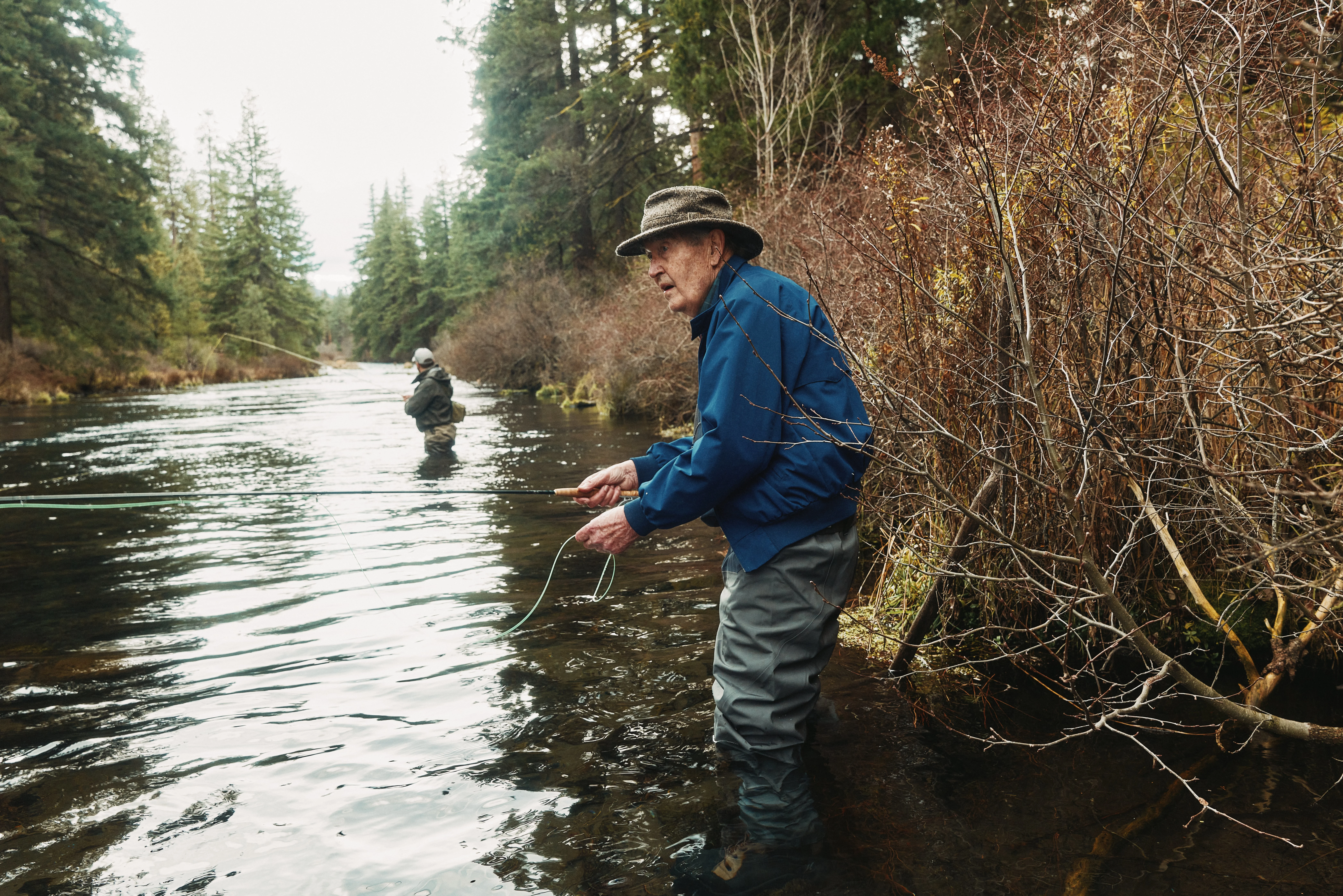
The anglers try their luck at another hole on the river. Mason Trinca
From the War Zone to the Uplands
Volker was born in 1940 in Berlin and lived with his teenage mother and grandmother in an apartment in the city. His father, a German soldier, was off fighting in France. During the war, he remembers rushing to hide in nearby bomb shelters as Allied planes besieged Berlin. For fuel, local Berliners went to the closest forest to cut firewood for both heat and cooking. Allied planes made regular, choreographed runs to drop off food, sustaining the civilians still in the city.
Early in the war, when the Germans took over France, Volker’s biological father found himself in occupied Paris. There, this young German soldier got caught cheating on his young wife, Volker’s mother. Word somehow reached her, and her response still strikes me as incredibly courageous: She divorced him.
After Germany lost the war, Volker’s mother took a job at a local hospital, where she tended to recovering soldiers, including Americans. One of the injured was an infantryman from Chicago who had been left for dead in the Battle of the Bulge. The wounded war hero soon fell in love and married Volker’s mother. Just as importantly, he embraced Volker as a son. Volker’s new dad also had a hobby: he loved to fish and hunt.
In 1950, the family moved from Germany to Fort Riley, Kansas. “Father,” as Volker called him, took him fishing one day at a lake on the base, and Volker was having all the luck. Suddenly, a pheasant cackled and the former GI sent his son to get it with the shotgun he had in the truck. Volker says the goal was really to get him out of the way so that his dad could catch a few fish. But when Volker returned with the bird in hand, his father was stunned. That was Volker’s first pheasant. Almost 70 years later, he still loves to bird hunt. And he’s still a crack shot.

Volker learned how to hunt and fish after he moved to America from Germany after WWII. Mason Trinca
Angling Roots
I never met my grandfather—but were it not for him, I likely never would have become an angler or a hunter.
My grandfather Myron was born in 1897, in Two Rivers, Wisconsin. The son of a Russian immigrant, Myron served in World War I but returned afterwards to the Manitowoc area, a rural place about 80 miles north of Milwaukee, where he worked at the family business, manufacturing milk filters for nearby dairy farmers.
In the 1930s, a middle-aged Myron, by then a successful businessman himself, bought some land on a lake in northern Wisconsin and had a cabin built. There, he hunted whitetails, played cards, and fished with his buddies.
That cabin has remained in my family since. It’s where I learned to fish.
My favorite childhood outing was to Catfish Lake where my father would stand in the shallows, holding our boat, while I caught one panfish after another from beneath the lily pads. Almost 40 years later, I still love to fish—these days on the fly.
Idiot Proof? Hardly
On the Metolius, things got off to a slow start for Volker and me. The first hole we fished was about three miles downstream of the headwater spring. There, we clearly saw the rainbows. They were submerged yet hovered, as if the water were merely an idea. I watched those trout swerve to eat bugs drifting in the current. I could see the glint from their skin—but seeing a fish doesn’t mean you catch it, especially on the Metolius.
I tried hard, making drifts with various flies, but nothing worked. It was a familiar result. Truth be told, I didn’t catch anything for the first five years that I fished the Metolius. The trout can be really picky.
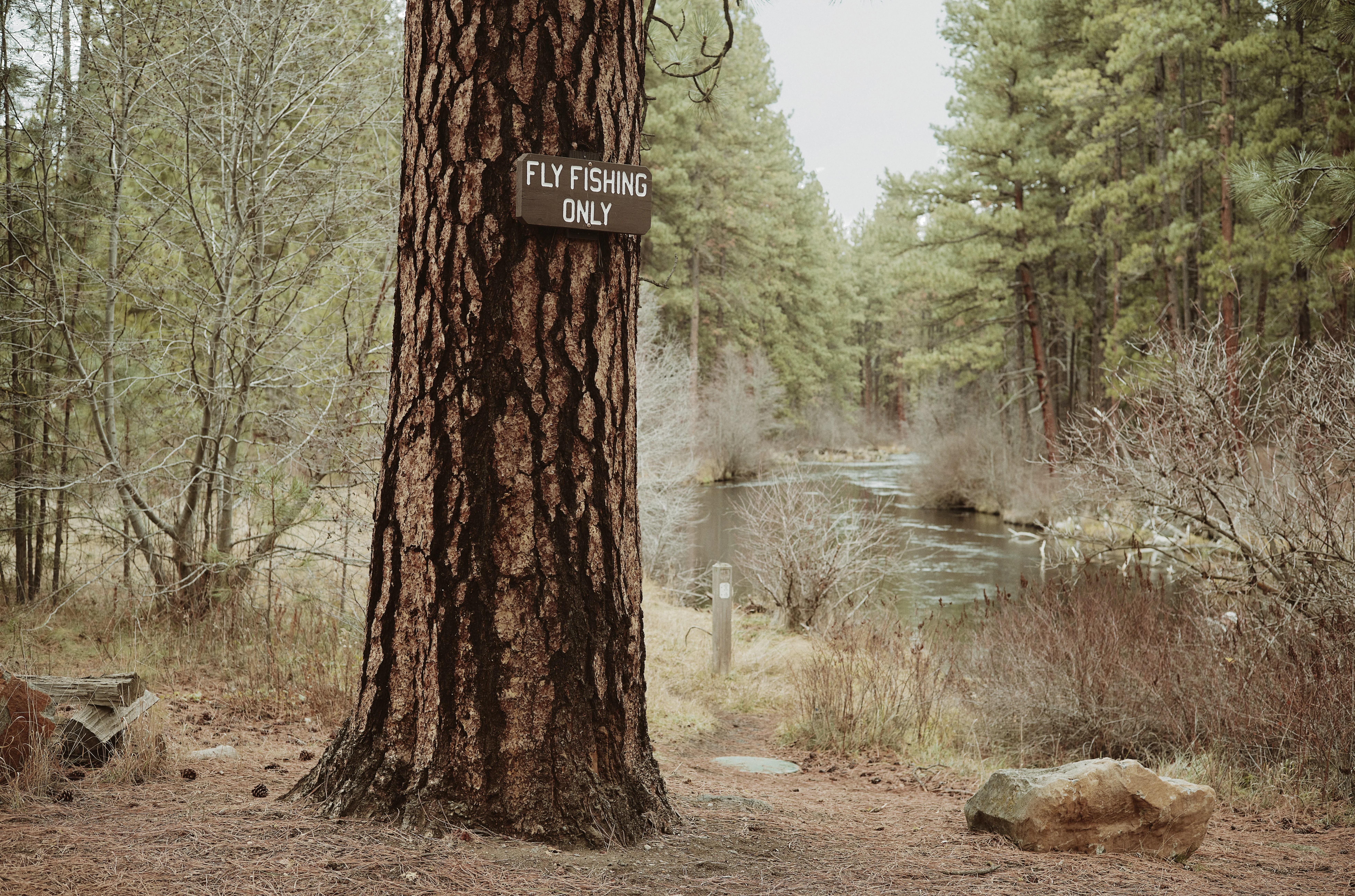
The Metolius is a challenging, but rewarding, river for trout anglers. Mason Trinca
Volker tried a variety of nymphs as well but came up empty-handed, and, as always, he didn’t seem perturbed. Again, I wanted him to catch a fish more, it seemed, than he did. Thus, I needed an even more reliable spot: the Idiot Hole. It’s where I go to catch the Metolius’ wily trout on dry flies. It’s so named because the joke was that, at one point, any idiot could catch a fish there.
The Idiot Hole is located about 100 yards upstream of a hatchery, but none of those hatchery fish make it into the river anymore. They’re stocked elsewhere. Nowadays, all the trout in the Metolius are born wild.
When the Idiot Hole was stocked with hatchery fish, not only could any idiot catch one, said idiot could bring it home for dinner. But that’s illegal now on the Metolius. It’s all catch-and-release. Because of these strict regulations, the river is replete with trout and the banks are free of the type of litter I come across on other waters: Styrofoam worm containers, fish guts, beer cans.
Volker and I walked upstream from the hatchery, through the forest. At the Idiot Hole, the water was shallow, but, about halfway across, an underwater canyon opened, as if the bottom somehow disappeared. I stood on the lip of it. Looking down, I could see trout hovering in the air-like water. Below those trout, there was only my imagination.
But my focus was on the surface, where the current eased. Insects normally land on it and get consumed, sometimes viciously, like a great white shark attacking a seal, and sometimes cautiously, like a grandmother sipping her tea. There were no bugs that day, however, in the air or on the water. I cast my dry fly anyway, which typically isn’t a good approach on the Idiot Hole. It’s best to wait for a rise and cast right to it.
Prospecting like this, I got nothing. Sharing the hole with me, Volker got skunked too, although he shrugged it off.
We were just two happy idiots.
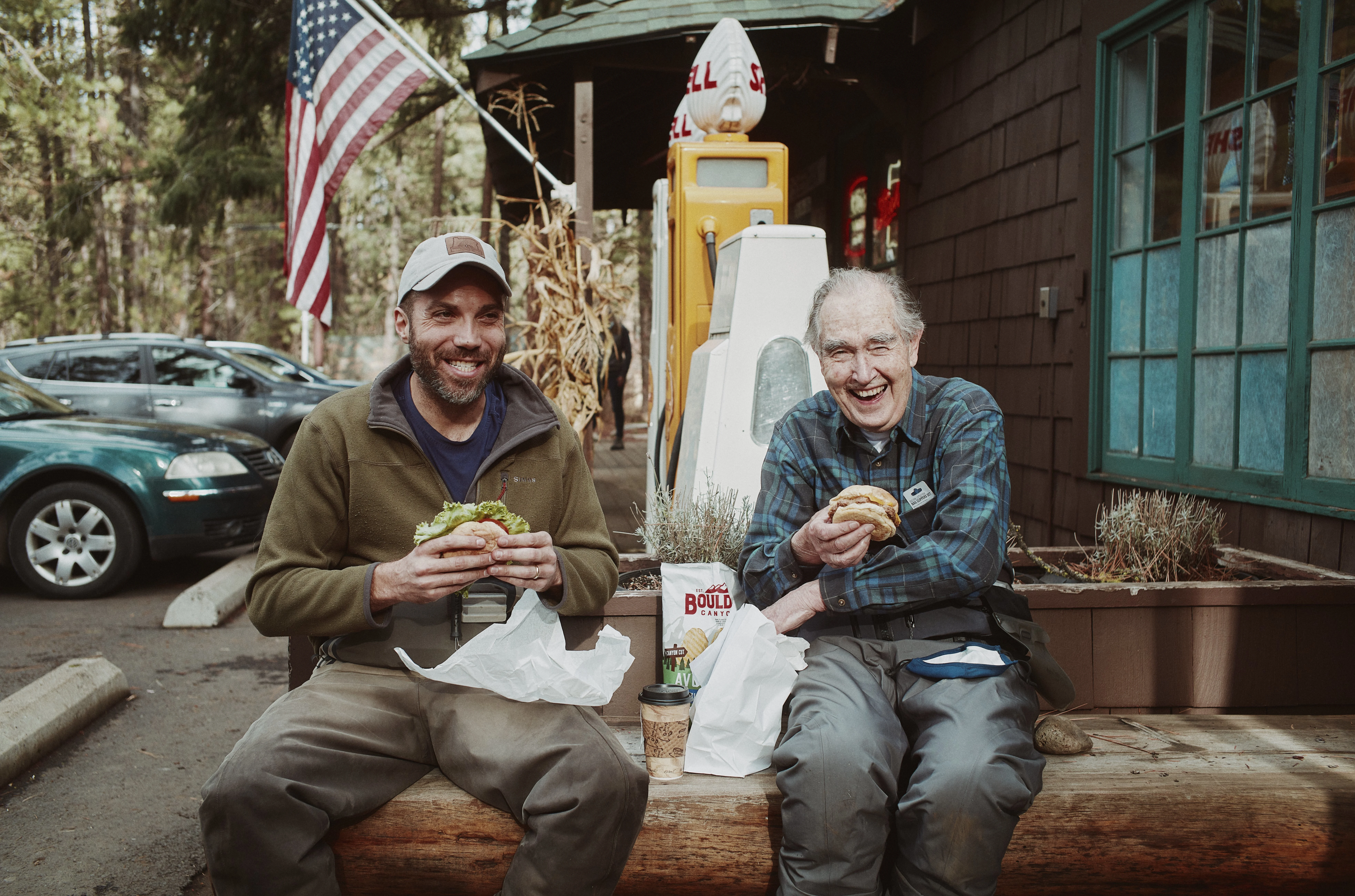
The anglers grab a bite after a tough day on the water. Mason Trinca
Passing It On
When he visits, Volker gives my dogs commands in German. “Platz,” he tells my big chocolate Lab. Stop. My kids even say it to the dog. Platz.
Micah, my son, is six years old and already a passionate angler. In fact, he’s started fishing with Volker and me. I want my son to learn much more than a few German words, however, from Volker.
He can learn how to handle a canoe and how to shoot well. He can also learn to appreciate fishing for what it is. Most importantly, Micah can learn what it means to be a good friend.

